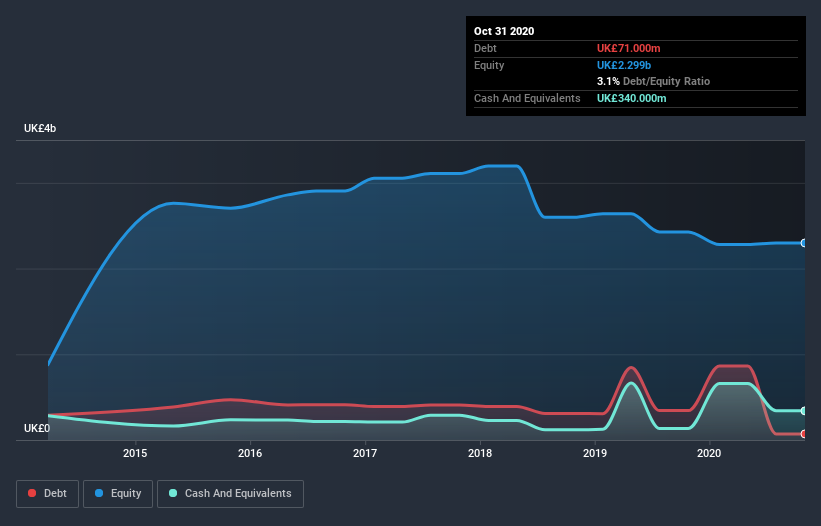These 4 Measures Indicate That Dixons Carphone (LON:DC.) Is Using Debt Reasonably Well
Howard Marks put it nicely when he said that, rather than worrying about share price volatility, 'The possibility of permanent loss is the risk I worry about... and every practical investor I know worries about.' When we think about how risky a company is, we always like to look at its use of debt, since debt overload can lead to ruin. As with many other companies Dixons Carphone plc (LON:DC.) makes use of debt. But should shareholders be worried about its use of debt?
What Risk Does Debt Bring?
Generally speaking, debt only becomes a real problem when a company can't easily pay it off, either by raising capital or with its own cash flow. Ultimately, if the company can't fulfill its legal obligations to repay debt, shareholders could walk away with nothing. However, a more common (but still painful) scenario is that it has to raise new equity capital at a low price, thus permanently diluting shareholders. Having said that, the most common situation is where a company manages its debt reasonably well - and to its own advantage. When we think about a company's use of debt, we first look at cash and debt together.
See our latest analysis for Dixons Carphone
How Much Debt Does Dixons Carphone Carry?
As you can see below, Dixons Carphone had UK£71.0m of debt at October 2020, down from UK£343.0m a year prior. But on the other hand it also has UK£340.0m in cash, leading to a UK£269.0m net cash position.
How Healthy Is Dixons Carphone's Balance Sheet?
Zooming in on the latest balance sheet data, we can see that Dixons Carphone had liabilities of UK£3.20b due within 12 months and liabilities of UK£2.12b due beyond that. On the other hand, it had cash of UK£340.0m and UK£782.0m worth of receivables due within a year. So it has liabilities totalling UK£4.19b more than its cash and near-term receivables, combined.
This deficit casts a shadow over the UK£1.38b company, like a colossus towering over mere mortals. So we definitely think shareholders need to watch this one closely. At the end of the day, Dixons Carphone would probably need a major re-capitalization if its creditors were to demand repayment. Given that Dixons Carphone has more cash than debt, we're pretty confident it can handle its debt, despite the fact that it has a lot of liabilities in total.
We note that Dixons Carphone grew its EBIT by 27% in the last year, and that should make it easier to pay down debt, going forward. There's no doubt that we learn most about debt from the balance sheet. But it is future earnings, more than anything, that will determine Dixons Carphone's ability to maintain a healthy balance sheet going forward. So if you're focused on the future you can check out this free report showing analyst profit forecasts.
Finally, while the tax-man may adore accounting profits, lenders only accept cold hard cash. Dixons Carphone may have net cash on the balance sheet, but it is still interesting to look at how well the business converts its earnings before interest and tax (EBIT) to free cash flow, because that will influence both its need for, and its capacity to manage debt. Over the last three years, Dixons Carphone actually produced more free cash flow than EBIT. That sort of strong cash conversion gets us as excited as the crowd when the beat drops at a Daft Punk concert.
Summing up
Although Dixons Carphone's balance sheet isn't particularly strong, due to the total liabilities, it is clearly positive to see that it has net cash of UK£269.0m. And it impressed us with free cash flow of UK£842m, being 144% of its EBIT. So we are not troubled with Dixons Carphone's debt use. While Dixons Carphone didn't make a statutory profit in the last year, its positive EBIT suggests that profitability might not be far away. Click here to see if its earnings are heading in the right direction, over the medium term.
Of course, if you're the type of investor who prefers buying stocks without the burden of debt, then don't hesitate to discover our exclusive list of net cash growth stocks, today.
This article by Simply Wall St is general in nature. It does not constitute a recommendation to buy or sell any stock, and does not take account of your objectives, or your financial situation. We aim to bring you long-term focused analysis driven by fundamental data. Note that our analysis may not factor in the latest price-sensitive company announcements or qualitative material. Simply Wall St has no position in any stocks mentioned.
Have feedback on this article? Concerned about the content? Get in touch with us directly. Alternatively, email editorial-team (at) simplywallst.com.

 Yahoo Finance
Yahoo Finance 
